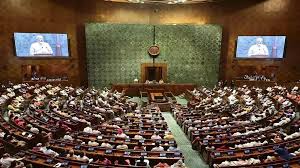In the parliamentary system, a Whip is a party official responsible for ensuring party discipline among Members of Parliament (MPs) and ensuring that they attend sessions and vote according to the party’s stance. The term “Whip” is derived from the tradition of a “whipper-in,” the person in hunting parties responsible for keeping the hounds in line, which metaphorically refers to maintaining discipline among party members.
In India, every political party with sufficient representation in Parliament appoints a Whip. The Whip is entrusted with ensuring that MPs vote in line with the party’s official position on key issues. The disciplinary functions of the Whip are so important that each party issues a “Whip” ahead of a crucial vote, indicating whether members should vote in favor, against, or abstain.
Whip is neither mentioned in the Constitution nor the Rules of the House and Parliamentary Statute.
About Whip:
- A whip in parliamentary parlance is a written order that party members be present for an important vote, or that they vote only in a particular way.
- The term is derived from the old British practice of “whipping in” lawmakers to follow the party line.
- The importance of a whip can be inferred from the number of times an order is underlined.
- Appointment:
In India all parties can issue a whip to their members.
Parties appoint a senior member from among their House contingents to issue whips — this member is called a Chief Whip, and he/she is assisted by additional Whips.
Types of whips:-
- One-line whip: A one-line whip, underlined once, is usually issued to inform party members of a vote, and allows them to abstain in case they decide not to follow the party line.
- Two-line whip: A two-line whip directs them to be present during the vote.
- Three-line whip: A three-line whip is the strongest, employed on important occasions such as the second reading of a Bill or a no-confidence motion, and places an obligation on members to toe the party line.
Roles & Responsibilities of Parliamentary Whips:
- Ensuring Party Discipline:
- The whip ensures that all members of the party are present and vote according to the party’s instructions during important legislative processes. This helps in maintaining the party’s unity and influence in the decision-making process.
- Issuing Whip Orders:
- A whip issues instructions to party members on how to vote in the House on specific bills, motions, or other issues. For instance, the whip might direct MPs or MLAs to vote “for” or “against” a particular piece of legislation.
- Maintaining Attendance:
- Whips ensure that party members attend sessions regularly, especially during critical votes. If a member does not attend a session without valid reasons, it could lead to disciplinary action within the party.
- Liaison Between Party Leadership and Members:
- Whips serve as a communication link between the party leadership (such as the party president or parliamentary leaders) and the members of the legislative body. They convey the party’s stance on various issues to members and ensure members’ concerns or issues are communicated back to the leadership.
- Ensuring Voting Unity:
- In many situations, especially on contentious or important issues, it is critical for the party to present a united front. The whip ensures that all members follow the party’s instructions on voting. Non-compliance can lead to disciplinary actions or expulsion from the party in severe cases.
- Management of Absentees:
- Whips ensure that any member who is unable to attend a session (due to illness, travel, or other reasons) is excused and that the party is informed of their absence in advance. In case of unexpected absences, whips might need to manage alternatives to keep the party’s strength intact.
- Dealing with Defections:
- In the context of India’s anti-defection law (the 10th Schedule of the Constitution), the whip plays a key role in ensuring that party members do not switch sides during voting. If a member defies the party’s whip, they may face disqualification under the law.
- Coordination During Key Votes:
- Whips ensure coordination among party members during crucial votes such as no-confidence motions, budget approval, or passing of key legislation. Their job is to ensure the party’s position is reinforced and voting is aligned with the party’s stance.
- Enforcing Party Decisions:
- The whip enforces the decisions made by the party’s central leadership regarding legislation or policy matters. They help implement party policies in the legislative chamber.
- Helping with Strategy and Planning:
- Whips also work on strategic planning in Parliament, helping party leaders plan the schedule of bills and motions, and determining the party’s approach to various legislative issues.
Challenges Faced by the Whip in the Modern Parliament
The role of the Whip is fraught with several challenges, especially in a rapidly evolving political environment. Some of the major challenges faced by Whips today include:
- Cross-party alliances and defections: In today’s fluid political environment, MPs may switch parties or form alliances outside the official party structure. This increases the pressure on Whips to ensure loyalty and maintain party discipline.
- Regional and ideological diversity: Indian political parties often represent diverse regions and ideologies, which can create friction when it comes to party-line votes. Whips must navigate this diversity and ensure that party members remain unified during key votes.
- Increased media scrutiny: The media’s focus on parliamentary proceedings means that Whips are under constant scrutiny. The pressure to maintain discipline in public can sometimes exacerbate conflicts within the party.
- Managing the Opposition: In an opposition-led environment, the Whip’s role is to make sure that the opposition MPs are present and vote according to their party’s position. With coalition politics becoming a norm, ensuring smooth coordination between alliance partners is an added responsibility for the Whip.
Defiance of Whip:
Defying a party’s whip in India can lead to the following consequences:
-
Disqualification under the Anti-Defection Law (10th Schedule):
-
Members can be disqualified from the House (Lok Sabha, Rajya Sabha, or State Assemblies) if they defy the whip on important votes (e.g., confidence motions, budgets).
-
The Speaker/Chairman decides on disqualification, based on a party’s petition.
-
-
Internal Party Disciplinary Action:
-
Expulsion from the party or suspension from party roles (e.g., leadership positions or committees).
-
Loss of party benefits and support for future elections.
-
-
Loss of Political Trust:
-
Damage to the legislator’s reputation and electoral prospects, especially if expelled or seen as a party rebel.
-
-
Legal Consequences:
-
Potential lawsuits or legal challenges by the party, especially if the defiance harms legislative functioning.
-
While the Speaker of the House and Ministers often receive the most attention during parliamentary sessions, it is the Whip who operates behind the scenes, ensuring that the wheels of democracy continue to turn smoothly.
In the context of Indian democracy, where coalitions and shifting party lines frequently determine the outcome of votes, the role of the Whip has become even more critical. From managing party discipline to ensuring smooth legislative progress, the Whip’s contribution to parliamentary functioning is undeniable.
In today’s highly politicized and polarized environment, the evolving role of the Whip remains crucial to sustaining parliamentary democracy in India. Whether during times of political stability or crisis, the Whip stands as a guardian of party discipline, ensuring that the collective will of the party is maintained in the face of external challenges.



